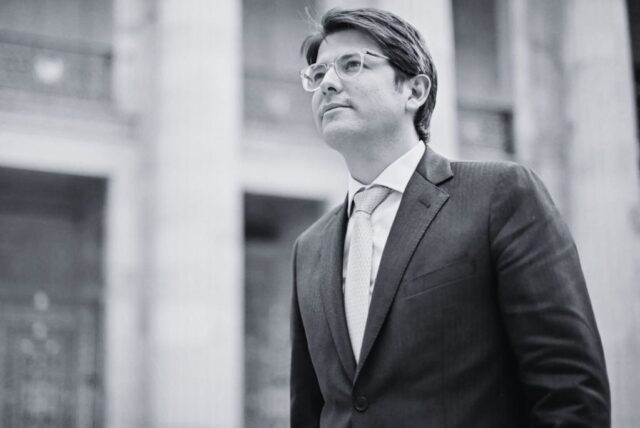The death of Colombian senator and presidential pre-candidate Miguel Uribe Turbay, which occurred today, August 11, 2025, after two months in critical condition due to an armed attack, has shaken Colombia and the continent.
On this day of deep sorrow for Colombia, we remember Miguel Uribe Turbay not only as a tireless political leader, but also as a family man, a dreamer, and a fighter for a fairer and more prosperous country. pic.twitter.com/Dq9uVsyFzU
— Jhonf Fonseca (@Jhonffonseca) August 11, 2025
This tragic event, perpetrated on June 7, 2025, by a hitman barely 15 years old, not only claimed the life of a prominent conservative leader from the Democratic Center party, but has also raised alarms about the deterioration of democracy in Colombia under the government of Gustavo Petro.
Uribe Turbay, known for his staunch opposition to Petro’s leftist policies, became a symbol of resistance to what many perceive as an authoritarian drift.
On June 7, 2025, Miguel Uribe Turbay was shot in Bogotá by a teenager who fired at close range.
The senator was struck twice, once in the head, and was rushed to a hospital where he remained in critical condition until his death.
The attack, described by Interior Minister Armando Benedetti as a possible “link in a chain of terrorist attacks,” evoked the worst moments of political violence in Colombia, such as the assassinations of leaders in the 1980s and 1990s.
Uribe Turbay, 38, was a rising figure within the Democratic Center, the party founded by former president Álvaro Uribe.
His critical stance on Petro’s social and economic reforms—especially regarding security and relations with armed groups—made him a target of threats.
The arrest of the young hitman, identified as Juan Sebastián, has not fully clarified the motives behind the crime, but has intensified suspicions among opposition sectors of possible political persecution orchestrated from within the government.
The government of Gustavo Petro, in power since 2022, has faced criticism for its handling of security and its rapprochement with groups such as the ELN.
The resurgence of violence in regions like Catatumbo, where the guerrilla has regained ground, and accusations of ties with Nicolás Maduro’s regime in Venezuela, have fueled the perception that Colombia is sliding back into a past of instability.
Uribe Turbay’s death adds to other incidents that have sparked concern, such as the 12-year house arrest sentence against Álvaro Uribe for procedural fraud and bribery, a ruling many consider politically motivated.
President Gustavo Petro posted a message on X after Uribe Turbay’s death, expressing condolences and stating that “life is above any ideology.”
However, this statement, steeped in progressive rhetoric, is deeply questionable in light of the facts.
Petro insists that his government prioritizes “the care and expansion of life” and does not persecute the opposition, but these words ring hollow given the context of political violence and the rise in threats against dissenting figures.
Uribe Turbay was not just a senator; he was a courageous voice that challenged Petro’s agenda, denouncing his rapprochement with armed groups like the ELN and his apparent tolerance for organized crime.
Petro’s claim that “violence in Colombia is being defeated” is belied by reality: the murder of an opposition leader in the capital, carried out by a minor, is a staggering failure in security policy.
His promise of a “thorough” investigation with international experts seems more like a maneuver to deflect criticism than a genuine commitment—especially when his administration has been accused of influencing judicial institutions, as in Álvaro Uribe’s case.
This message from Petro not only lacks credibility, but also appears to be a cynical attempt to whitewash his image while the opposition pays with blood for confronting him.
Before his death, Uribe Turbay’s lawyer filed a complaint with the Inter-American Commission on Human Rights (IACHR), alleging Petro’s interference in the case and even requesting the intervention of Donald Trump’s government. This request reflects the growing polarization in Colombia and the distrust toward judicial institutions, which some perceive as being used as tools by the Executive.
Colombia now mourns Miguel Uribe Turbay, but also seethes with outrage at a government that, under Gustavo Petro, seems incapable of ensuring the safety of those who challenge his ideological project.
The death of a young, brave, and charismatic leader—who embodied the hope of a renewed opposition—is not only a symptom of democratic fragility, but also a direct accusation against a regime that tolerates chaos while preaching peace.
The attack by a minor is not an isolated incident, but the reflection of a country where political violence is re-emerging with the complicity of a government that, instead of confronting it, hides behind empty speeches and promises of investigations that never uncover the truth.
Petro’s inability to control armed groups, his ambiguity toward organized crime, and his history of polarization have created a climate in which dissent is paid for in blood.
Colombia cannot continue burying opposition politicians while Petro washes his hands.
Democracy demands justice, not more empty condolences.
About The Author
Post Views: 1
👁️ 1 vistas











